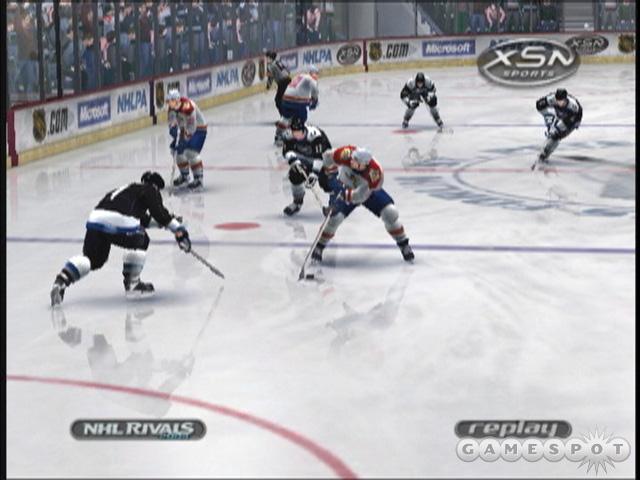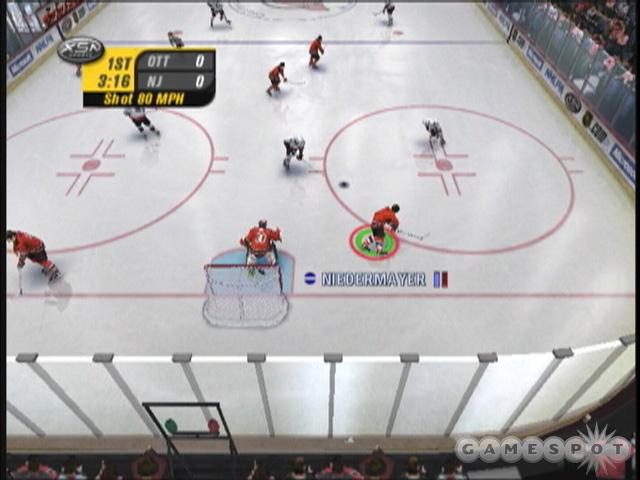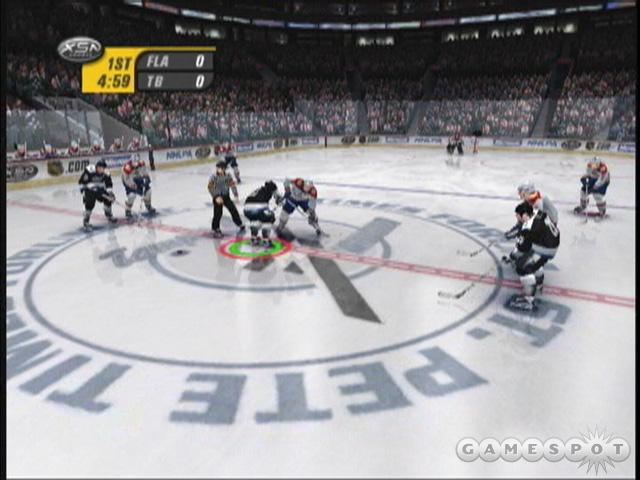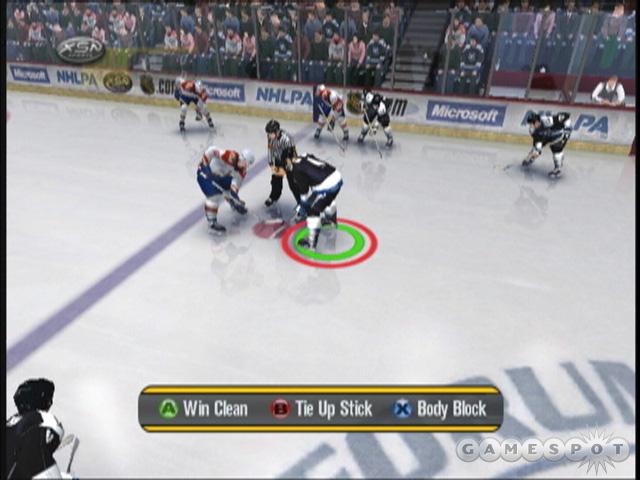Earlier this year, Microsoft announced NHL Rivals 2004, the company's very first attempt at the sport of professional ice hockey. Rivals 2004 is a simulation-style hockey game that clearly draws influence from gameplay elements found in both EA and Sega's NHL games. Unfortunately, NHL Rivals 2004 doesn't do much to set itself apart from the competition, and, additionally, it has some rather problematic flaws that deteriorate its gameplay to the level of subpar, at best.

Anyone who has played either ESPN NHL Hockey or NHL 2004 ought to be able to pick up NHL Rivals 2004's controls pretty quickly. Rivals' primary player controls, when in possession of the puck, include deke, pass, dump, and shoot buttons, while dive, stick check, body check, and player switch buttons are used when not in control of the puck. The right thumbstick lets you pinpoint pass to other players by tapping in the appropriate direction; you can execute a drop pass by pressing the right thumbstick in. Coaching schemes can be altered by using the directional pad, and you can speed burst and pivot with the right and left trigger buttons. For the most part, Rivals' controls are fairly responsive, though certain actions, like deking and winding up for a slap shot, feel a little bit off and require a little bit of off-timing to perform correctly. Additionally, the lack of a "freestyle" deking system, similar to what EA and Sega offer with the right thumbstick, is a little disappointing.
NHL Rivals 2004 does have one unique control innovation that ties directly into what is referred to as the game's "role-playing" system. Each player in the game has his own specific type of role on the team, just as in real-life hockey. To elaborate on this a bit further, Rivals assigns one of four role types to each player. The four role categories are balanced, sniper, agitator, and enforcer. Each category is about what you would expect it to be. Snipers are your goal-scoring threats, agitators are your penalty-drawing guys who break up plays, enforcers are your fighters, and balanced players aren't especially brilliant in any one category but have respectable abilities in each. Roles are also defined by a specific action that can be performed by pressing a "role" button on the controller in the appropriate situation. For instance, snipers can use a nifty little spin maneuver when holding on to the puck, and they can also perform a stick clip move to disrupt the shots of opposing players. Enforcers can give a defender a little bump-and-go while holding the puck, and they can wallop opponents with hard can-opener checks when on defense. The role-playing system is definitely a cool idea, and Rivals actually executes it pretty well.
NHL Rivals 2004 is most certainly geared to cater to fans of simulation hockey but lacks the cohesive gameplay of its competitors. The game just feels very loose and sloppy in some key areas. Specifically, Rivals' AI is often questionable at best, especially when it comes to goalies. No matter what team you are playing and no matter how good your goalie is, he will give up a huge number of rebounds in every game. Sure, every goalie coughs up a few here and there, but in Rivals, more than half the scores in the game seem to come off of rebounds from previous shots that should have easily been swallowed up by the goalie, either with his glove or by a pounce-move on the puck. Your skating teammates aren't much better, either. Despite the hefty number of rebounds, AI players hardly ever jump on these scoring opportunities when they present themselves. Instead, they often skate right by the puck as it slides around near the net, thus leaving it unattended for an opposing player to pick up. On the defensive side, your defensemen don't seem to quite have as good of a knack for getting in front of shots and picking up loose pucks as they should. The AI does get a little less complacent as you turn up the difficulty level but only to a marginal degree.
Another AI-related issue stems from what really feels like some pretty cheap rubber-band AI when your opponent is down. No matter what team we were playing against or how long we managed to keep a lead, opposing CPU teams would frequently either tie-up or take the lead in the third period off of some quick, cheap goals or questionably timed penalties that led to long strings of power-play opportunities. One could make the argument that this sort of thing happens in hockey all the time, where--come the third period--a team will start rallying and will start using more aggressive tactics to get the puck in the net. Although this may be true, rarely in the NHL do you suddenly get a slew of oddly timed penalties in the third period right as a team is beginning to rally, nor do goalies often suddenly become prone to missing easy shots that they'd been stopping all game-long.

These things said, NHL Rivals 2004's gameplay has its positive points as well. The game's pacing is pretty well done, though it's perhaps a bit slower than competing sim-style hockey games. Slight adjustments to the default speed settings easily correct this, though. The game features an original method of handling faceoffs, with a three-button option menu that appears during one. Here you have the option to win clean, tie up your opponent's stick, or execute a body block. Deciding which button to press basically comes down to a game of rock-paper-scissors, but despite its relative simplicity, it does add a decent air of variety to faceoffs. Rebounds aside, scoring in and of itself is pretty accurate, with expectedly low-scoring games resulting when two defensive-minded teams play and higher scoring affairs resulting when more offensively explosive clubs meet. Checking is also pretty easy and fun to perform, as it lets you lay some very solid hits on your opponents. Unfortunately, the same can't be said for the game's fighting system, which is really awful. When all is said and done, Rivals' gameplay system has its positive moments, but they are equally matched by its problems.
As mentioned before, NHL Rivals 2004 is Microsoft's first attempt at hockey, and, as a result, the game is a pretty bare-bones effort when it comes to available gameplay modes. Predictably included are the usual single game, season, tournament, and playoffs modes. However, there is no franchise mode. The season mode lets you perform trades, it lets you assign free agents to different teams, and it lets you manage basic coaching functions for a full NHL season--but that's it. No salaries, no drafts, and no future are presented beyond that lone season. Rivals also features a mode called instant rivalry. By selecting it, you will play a single game between two teams who have historically been at odds with one another, whether it be due to feuding fan bases or division rivalries. Unfortunately, you can't choose what pairings of teams you'd like to have square off. Basically, random chance determines what rivalry you'll end up with, so, when you consider that the game doesn't really play any differently in this mode, there isn't a whole lot of point to it.

As with all of Microsoft's first-party sports titles for the Xbox, NHL Rivals 2004 is Xbox Live-enabled and features all the benefits of Microsoft's XSN, or Xbox Sports Network. The XSN support is exactly as it is in its NFL and NBA counterparts and features online leagues and tournaments, complete with stat and transaction tracking available through e-mail. In terms of the standard online play, you can obviously jump right into a regular game of hockey between two Xboxes, but you'll also have another type of game available. Pickup hockey is an online-exclusive mode where up to six different Xboxes can log into a single game to play 1-on-1, 3-on-3, 2-on-1, or whatever number combination you can come up with between two and six (depending on how many players you have, of course). Pickup hockey takes place on outside rinks, away from the glitz and glamour of fancy hockey arenas, and, during the game, each player is relegated to a single, controllable player. That player, of course, can assume any of the different roles available in the normal game. It's a cool, little mode, and it's actually kind of a shame it isn't available offline. As far as online performance goes, the game played just fine and only featured a couple of drop-offs here and there; no lag worth mentioning was noticed.
NHL Rivals' graphics are probably its strongest feature, but they still have some notable issues. Rivals' best visual asset is most certainly its excellent-looking hockey arenas, which are full of detail and polish in most every aspect--especially when it comes to the ice itself. The game's player models look pretty good as well, though they're a bit blockier than in other recent hockey offerings. A good portion of the game's marquee players have their own unique faces, and they also look appropriately accurate. Apparently, only the most recognizable name players have warranted their own faces, so you'll see quite a few generic ones throughout the game. Unfortunately, the generic faces don't look quite as good, nor do they look terribly close to accurate with regard to the players they're supposed to represent. The graphics' biggest sticking point comes in the category of animation, which, for the most part, looks very stuttery and off-kilter. Some of the stand-alone animations look good by themselves, but it seems like the game really lacks any solid transition animations to go between them, which leads to a lot of herky-jerky movement on the ice that just doesn't look natural at all. There's also a decided lack of any real cutscene or celebration animation, and what the game does provide in that respect is rather paltry compared to some of the excellent scenes depicted in Sega, EA, and, Midway's NHL offerings.
Rivals' sound presentation lacks in most every category. The obvious highlight here would be its soundtrack, which contains some good, if not immediately recognizable, tunes. Since the game supports custom soundtracks, you can basically program it at will. Some of the in-game effects are pretty good also, like the nicely reactive and realistic-sounding crowd noises and the sounds of skates cutting through the ice. However, there are definitely some problem areas with the sound effects as well. Certain actions, like checking another player or hitting a slap shot, just don't sound right at all, and the understated effects used are actually pretty pathetic. The game's commentary is provided by the duo of Sam Rosen and John Davidson, who, while reasonably accurate when it comes to the action on the ice, don't do much to distinguish themselves. Overall, much of the commentary feels incidental rather than realistic.

One could try to make excuses for NHL Rivals 2004 by stating that it's a first-time effort and that, obviously, Microsoft couldn't do everything that the competition is doing since its got so little comparative experience under its belt. While this is a fair statement, even for a first try NHL Rivals is a decidedly underwhelming effort that does little to impress you beyond some flashy visual touches and a few good gameplay concepts that don't quite hold up under the weight of the game's larger issues. Perhaps, with time, Microsoft will come into its own with the Rivals franchise and can then take the game to the level of the current competition's NHL titles. But, as far as Rivals 2004 goes, with so many better hockey games on the market today, it simply cannot be recommended.